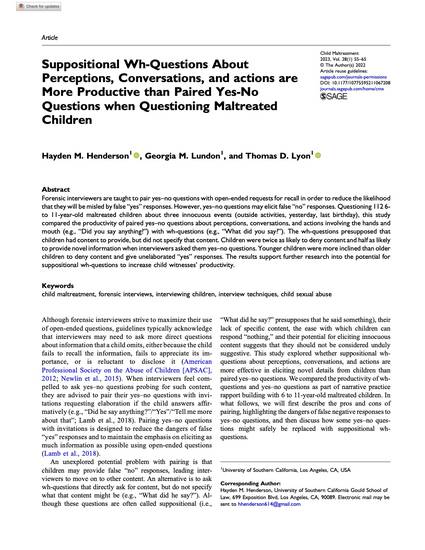
Article
92. Suppositional wh- questions about perceptions, conversations, and actions are more productive than paired yes-no questions when questioning maltreated children.
Child Maltreatment
(2022)
Abstract
Forensic interviewers are taught to pair yes-no questions with open-ended requests for recall in order to reduce the likelihood that they will be misled by false “yes” responses. However, yes-no questions may elicit false “no” responses. Questioning 112 6- to 11-year-old maltreated children about three innocuous events (outside activities, yesterday, last birthday), this study compared the productivity of paired yes-no questions about perceptions, conversations, and actions involving the hands and mouth (e.g., “Did you say anything?”) with wh- questions (e.g., “What did you say?”). The wh- questions presupposed that children had content to provide, but did not specify that content. Children were twice as likely to deny content and half as likely to provide novel information when interviewers asked them yes-no questions. Younger children were more inclined than older children to deny content and give unelaborated “yes” responses. The results support further research into the potential for suppositional wh- questions to increase child witnesses’ productivity.
Keywords
- child abuse,
- child sexual abuse,
- wh- questions,
- yes-no questions,
- child forensic interviewing
Disciplines
Publication Date
February 28, 2022
Citation Information
Henderson, H.M., Lundon, G.M., & Lyon, T.D. (2023). Suppositional wh- questions about perceptions, conversations, and actions are more productive than paired yes-no questions when questioning maltreated children. Child Maltreatment, 28(1), 55-65.
